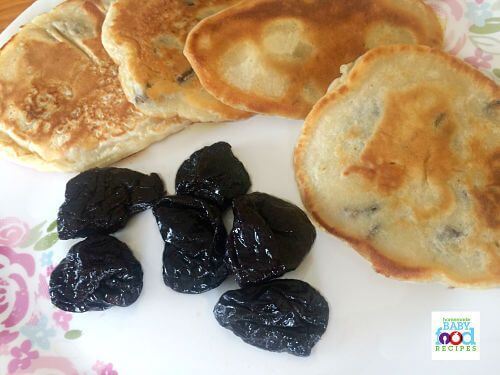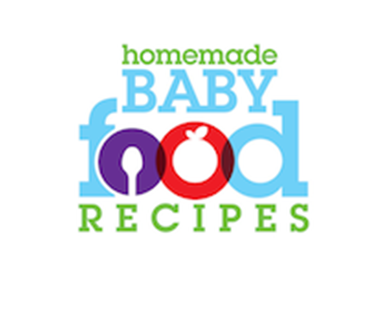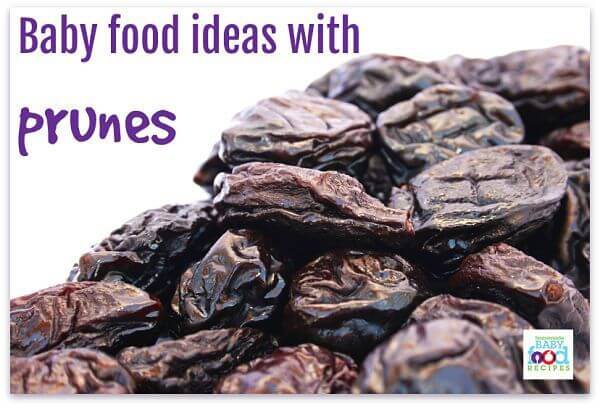Prunes Baby Food Ideas
Updated Aug 30th, 2023
They’re sweet, highly nutritious and great in both savoury recipes and desserts.
Yet few of us think of including prunes in meals for our babies!
In this article we’ll show you just how healthy prunes can be, and give you some great ideas for adding them to baby’s menu!
A few facts about prunes
Prunes are actually dried plums.
They’re a well-known remedy for constipation – particularly among the elderly population – and it’s that association that has made them rather LESS popular with everyone else!
In the US, producers decided to try to change the public perception of prunes by marketing them as ‘dried plums’ instead.
Even we have to agree that there’s just something more appealing in that description!
In the UK and other parts of the world, however, they’re still known as prunes, and that’s how we’ll refer to them in this article.
Although all prunes are dried plums, not all varieties of plums are dried to produce prunes.
The plums grown to make prunes are the ‘freestone’ variety (the type with the pit that’s loose and easy to remove).
The plums are sun-dried or dried using hydrators – with no fermentation involved – and the pits are removed before packaging.
Unlike many other dried fruits, prunes are usually dried without the use of sulfates.
The purpose of sulfates in the drying process is to prevent the fruit darkening.
But since prunes are dark in colour anyway, sulfates aren’t needed.
This is good news if your baby is sensitive to sulfates – but always check the packaging when you buy prunes, just to be on the safe side.
What are the health benefits of prunes?
When plums go through the drying process that creates prunes, the concentration of nutrients and anti-oxidants rises (although the vitamin C content is virtually destroyed).
The fact that they provide concentrated nutrition makes them ideal for baby food, where they are only consumed in small amounts.
Even better news if you’re the parent of a fussy eater!
- They’re high in iron, potassium, vitamin K and beta-carotene (which the body converts to vitamin A).
Vitamin A is important for good vision. - They contain nutrients called phenols, which act as anti-oxidants.
Prunes actually contain more anti-oxidants than the popular ‘superfood’ blueberries. - They are one of the best foods for bone health and studies have shown that they help prevent osteoporosis (lack of bone density) in later life.
- Regular consumption of prunes is believed to help lower blood pressure, reduce cholesterol, prevent type 2 diabetes and reduce the risk of colon cancer in later life. These are great reasons to encourage baby to enjoy them from an early age!
- They contain plenty of fibre and a natural sugar called sorbitol.
Sorbitol draws moisture into the digestive tract, making bowel movements easier. This is why prunes or prune juice are so often recommended to cure baby’s constipation.
Tips for buying and storing prunes for use in your baby food recipes
You can usually find prunes in the baking aisle of your local supermarket, along with other dried fruits like raisins and apricots.
Occasionally you can find them canned.
For the very best prunes, you may need to take a trip to the deli and look for Pruneaux d’Agen.
Grown in southwestern France, these are dried very gently, producing a succulent texture (rather than a ‘dried’ one) and a delicious flavour.
California is the world’s leading producer of prunes and most of the ready-to-eat prunes found in supermarket aisles are Californian in origin.
Prunes are usually sold pitted, although you sometimes still find them sold with the pits intact.
Always check the packaging to make sure it is completely sealed, otherwise they will have lost much of the little moisture they have.
Most ready-to-eat varieties will last for months if kept in a cool, dark place in an airtight container.
You can extend this even further by keeping them in the fridge.
A few words of caution about prunes
Wonderful as they are, there are a few things to bear in mind when serving prune – or prune juice – to your baby…
- Prunes can cause gas (wind).
Start by offering them in very small quantities at first, just to be sure they don’t cause any problems for your little one. - Avoid them altogether if your baby has diarrhea. They will make it worse.
- If you are trying to relieve constipation, prune juice can be gentler on baby’s tummy than pureed prunes.
This is because the whole fruit contains more fibre.
That being said, the juice is higher in sugar – and some brands are even mixed with high fructose corn syrup!
Our preference is to use the whole fruit, starting with a teaspoon or so of puree and gradually increasing the amount if necessary.
Throughout life, the whole fruit will always be a healthier option than the juice. Drinking juice enables your child to consume a lot of sugar very quickly. - Prunes are high in calories. Whilst this isn’t a concern when you’re making baby food, it’s definitely something to bear in mind in later life.
- Prunes stain clothes! We found this out the hard way, and devoted one bib solely to prune-based dishes.
Prunes baby food ideas
Prune puree
This is very simple to make!
Almost all prunes will need soaking before pureeing, to re-hydrate them.
We like to use warm, unsweetened apple juice for this, but plain old warm water will do the job!
You can either simmer them gently in the liquid, or just leave them sitting in it.
Once they’ve softened enough, just pop them in the blender and whiz, until you’ve reached the desired texture.
We find it hard to get prune puree completely smooth, even after rehydration.
The way we solve this is to add in some of the soaking liquid – it really helps achieve the desired consistency!
Canned prunes – if you can get them – are fully hydrated and ready for pureeing.
But don’t make the mistake we did and empty them into the blender without checking the can.
An awful cracking, splintering sound quickly alerted us to the fact that canned prunes are NOT always pitted!
It’s also important to check the prunes are canned in juice, not syrup.
Another thing we notice is that prune puree never solidifies completely when frozen.
It always feels sticky.
This may not bother you – but if you want it to freeze hard then, again, adding back some of the cooking liquid can help.
More great ways to include prunes in baby’s menu
Savoury ideas
- Combine chopped prunes with minced pork and fresh breadcrumbs to create meatballs.
Simmer until cooked in a simple tomato sauce. - Make these Cheesy Eggy Triangles.
But spread the bread with prune puree after you’ve toasted it on one side, then top it with the egg/cheese mixture.
Sounds bizarre – tastes great! - Serve prune puree as a sauce over chicken or pork.
To make a thinner gravy, simmer a couple of prunes and half a chopped apple in homemade chicken stock and puree well. - Mix prune puree with mashed carrot. Delicious!
- Carefully stuff prunes with cream cheese, then wrap them in puff pastry. Bake at 200° C (400° F) until golden and serve as a gourmet finger food!
Sweet ideas
- Add chopped or pureed prunes to baby’s oatmeal.
- Use pureed prunes ( made without additional liquid) as a simple ‘spread’ for fingers of toast.
You can even create a unique peanut butter and jelly sandwich, with pureed prunes as the ‘jelly’! - Prepare homemade ice cream and use prune puree as the sauce.
- Stir pureed prunes into homemade yogurt as a natural sweetener.
- Jazz up your prune puree by simmering prunes in juice with cinnamon and/or cloves.
- Mix with finely chopped ripe pear, a touch of powdered sugar and a drop of vanilla.
You can also use prunes as a healthy substitute for fat when baking.
To do this, simply rehydrate ½ lb prunes with 6 tablespoons of warm water, then puree thoroughly.
Perfect Prune Pancakes
This recipe makes 6 pancakes.

1 egg
5 pitted prunes, chopped (if they are very dry, soak them first)
3/4 cup milk
1 cup all purpose (plain) flour
1 teaspoon baking powder
- Beat the egg in a bowl and stir in the milk, then the chopped prunes.
- In a separate bowl, combine the flour with the baking powder.
- Add the dry ingredients to the egg/milk mixture and beat well until thoroughly combined.
- Heat a little oil in a frying pan, then spoon in the pancake batter to create 6 small pancakes.
- Cook until set, then carefully turn with a spatula and continue to cook until both sides are golden.
I do hope your little one enjoys these prune baby food ideas. Please contact me if you have a recipe or idea you’d like to share!


